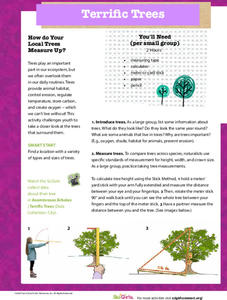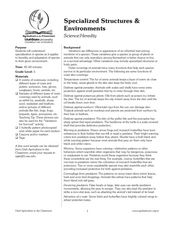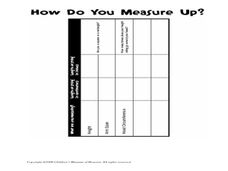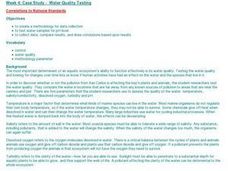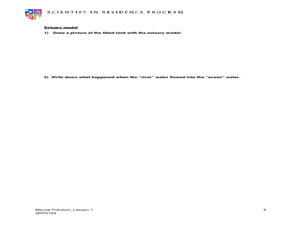Chicago Botanic Garden
Calculating Your Carbon Footprint
Unplugging from technology for one day per week will decrease your carbon footprint—are you up to the challenge? Part two in a series of three allows individuals to explore their personal carbon footprints. By first taking a quiz at home...
Chicago Botanic Garden
Carbon, Greenhouse Gases, and Climate
Climate models mathematically represent the interactions of the atmosphere, oceans, land, sun, surface, and ice. Part two in the series of four lessons looks at the role greenhouse gases play in keeping Earth warm and has participants...
Chicago Botanic Garden
Calculating Your Ecological Footprint
You can lower your ecological footprint by recycling! Lesson four in this series of five has individuals, through the use of a computer, calculate their ecological footprints. Through discussions and analysis they determine how many...
PBS
Terrific Trees
Engage in a shady activity to practice measurement techniques. Classes venture outside to collect measurements of various trees, using different strategies to measure the height, trunk circumference, width, and crown size. Then they...
Curated OER
Cricket Wars
Third graders explore living and nonliving things in a garden environment. In this garden environment instructional activity, 3rd graders study the effects of crickets in a garden. Students explore the interaction between living and...
Curated OER
Apple Science
Sixth graders explore agriculture by viewing a fruits and vegetables video clip. In this apple characteristics lesson, 6th graders discuss how fruits and vegetables deteriorate after being exposed to oxygen and identify methods to defend...
Curated OER
Specialized Structures and Environment
Fifth graders read about how different animals protect themselves, and how characteristics give animals an advantage in their environment. Students then discuss a variety of "outer" wear for humans, and what they might choose to wear in...
Curated OER
Unit: Processing and Manufacturing: Examination Three
StudentsMatch the vocabulary terms in column A with the definitions in column B. Write the letter of the definition in column B in the space next to the terms in column A. Afterwhcich, students Write short answers or fill in the blank to...
Curated OER
The Earth is a Changin'
Students view examples of different types of erosion. In this erosion lesson, students discuss the different types of erosion and how erosion changes Earth. Students explore erosion and the effect it has on engineering.
Curated OER
Mixtures
Students observe that movement of a solute in the solvent increases the rate of dissolution. They demonstrate that when the solute is broken into smaller pieces it dissolves faster.
Curated OER
Manduca
Young scholars investigate the basic survival needs of both hornworms and humans. They compare and contrast the them by making a class list.
Curated OER
Hunt the Fact Monster Hunt #23
In this internet research instructional activity, learners answer three multiple choice and seven short answer questions by using the Fact Monster search engine.
Curated OER
How Do You Measure Up?
Students measure their body. In this measurement lesson plan, students use a string to measure their height and the circumference of their head. They record this information on the worksheet provided and answer questions as a group.
University of Wisconsin
Rain Garden Maintenance
Maintaining a garden is an ongoing responsibility. This resource follows a series of activities in a unit that resulted in the planting of a rain garden. What you will find here are general instructions for watering, weeding, pruning,...
Curated OER
Chill Out: How Hot Objects Cool
Teach how to explore exponential equations. For this Algebra II lesson, young scholars investigate the graph that occurs as a hot liquid cools. Students model the data algebraically.
Curated OER
Biodiversity and Ecosystems
Middle schoolers differentiate between biotic and abiotic factors in this science instructional activity. Learners collect data for the experiment and analyze the data after graphing it using the CBL 2. This experiment is split into two...
Curated OER
Energy Content of Foods
Learners collect data, organize and analyze the data and compare it to real life scenarios. This assignment requires two class periods.
Texas Instruments
How Do Pinnipeds Stay Warm?
Learners experiment to determine ways different types of insulation materials work. For this animal adaptation lesson, they make hand coverings from plastic bags, shortening, feathers, and wool. They observe effects of these insulating...
Curated OER
How Much Energy is Stored in Wood?
In this energy instructional activity, students create calorimeters out of soda cans and use them to calculate the amount of energy stored in different types of wood.
Curated OER
Water Quality Testing
Student explore factors affecting ecosystems. They test local water samples for pH level. After creating a methodology for data collection, they collect data, compare results, and draw conclusions based upon results.
Curated OER
Modeling Estuaries
Students create a model estuary. In this modeling estuaries lesson, students identify characteristics and mix water of varying densities. Students form a hypothesis, conduct an experiment, and analyze the results.
Curated OER
Reptiles and Amphibians
Fourth graders explore biology by viewing animal videos in class. In this amphibian and reptile lesson, 4th graders identify the key differences between reptiles, amphibians and other animal classifications. Students view video clips in...
Curated OER
Freshwater Fish Water Quality
Sixth graders work together to complete an experiment about the quality of freshwater. In groups, they collect fresh water samples from a variety of sources and test the pH levels. After completing a KWL chart, they test the amout of...
Curated OER
Health of Aquatic Life a Real Problem
Learners explore the health of aquatic life in this science lesson They measure and track the oxygen level in the water to determine the health of the aquatic life. They collect this data using the TI explorer to graph and analyze their...





